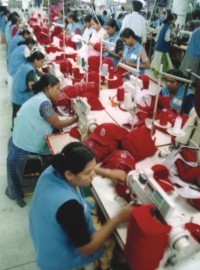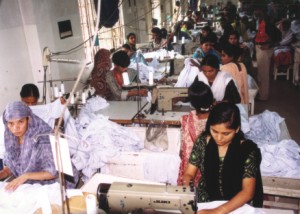|
Business
Will
Bangladesh Get Quota-free Access?
Shamim Ahsan

Christina
Rocca |
“I
am not so hopeful, it will be a very hard job," said
Christina Rocca, US Assistant Secretary for South Asian Affairs,
in response to Bangladesh's plea for duty-free access of its
apparels to the US market. The note of foreboding was not
out of the blue, but, in Bangladesh, the garment industry
leaders refuse to get depressed by Rocca's comment. They are
rather quite confident that Bangladesh is going to make it.
Now, where
Bangladesh will ultimately stand, only time can say. But one
thing is for sure, getting duty-free access to US market is
something Bangladesh desperately needs for its garment industry.
And it is not going to be easy.
The country's
garment industry is passing through a transition period. After
having grown and flourished in a quota-restricted world, it
is now entering into a fiercely competitive quota-free world.
The industry is not yet on a strong footing and far from being
in a position when it can compete with giant garment exporting
countries like China and India. Experts and leaders in the
garment business are thus trying to secure some advantages
that they believe would save the sector from at least an immediate
collapse in export volume. Getting duty-free access to the
US market is that answer.

Due
to the last MFA phase out the export volume of Bangladeshi
apparels may drastically fall |
Apparel
manufacturer and exporter leaders sound very optimistic. In
fact a BGMEA team led by its President Annisul Huq made a
visit to USA in the last week of April to pursue Bangladesh's
case. Grameen Bank's Dr Muhammad Yunus was in the team and
he used his friendship with former first Lady and Senator
Hillary Clinton and other connections in the highest tier
of American administration to help out the team. The team
met several Senators and Congressmen including senior Republican
Congressmen Mac Cain, Joseph Crowley besides Hillary Clinton
to pursue Bangladesh's case. Now, after all that effort, a
bill is going to be placed seeking duty-free access to US
market for some of the LDCs (Least Developed Countries) including
Bangladesh.
At present,
33 out of 49 LDCs enjoy duty-free access to the US market.
Among them most are African and South American countries.
And among the 16 that are not presently receiving this favour
four countries are certainly not going to get it. "The
present US policy is that they are not going to provide this
facility to countries that do not have democracy," Anwarul
Alam Chowdhury Parvez, Second Vice President of BGMEA and
a member of the touring BGMEA team, explains. Bangladesh is
among the remianing 12 that, he believes, is definitely going
to get the green light.
In Dhaka
the business leaders, who met Secretary Rocca, pointed out
that France with an annual export to US that stand at 8,900
crore US dollars, is currently paying around 33 crore US dollars
as duty. Interestingly, US earns the same amount as duty from
just 200 crore US dollars worth of Bangladeshi products. As
one of the poorest countries Bangladesh should get a better
deal, they argued.
But good
arguments alone would not win the case in favour of Bangladesh.
The BGMEA leadership is doing their bit. "We have appointed
lobbyists and are in constant touch with our buyers who are
also backing us," Pervaz relates. But the government
will also have to play a decisive role, he points out. "
In the end we are just a private organisation, and there is
a huge difference between our appeal and that of the government.
Besides, since we have direct interest in the deal, our argument
regarding the country's interest may not be taken seriously,"
he argues. He however hastens to add that so far the Bangladesh
government is giving them full support. "Specially the
embassy people in USA have been constantly with us and have
done their best for us during our last month's visit,"
he reveals.

BGMEA
leaders are lobbying to get duty free access for Bangladeshi
apparels to the US market. |
He
informs that a team of policy-makers and businessmen from
the US are visiting Bnagladesh next month on the invitation
of BGMEA. Foreign Minister Morshed Khan is also visiting USA
next month to pursue the case, which he believes will have
a positive impact on Bangladesh's chance of getting duty-free
access. "If the government continues to assist we stand
a very, very good chance to make it," he hopes.
There are
hurdles that we still need to get over though, says Parvez.
The American Federation of Labour Organisation, a trade union
association, is an extremely powerful body in the US. If they
taken a stand against Bangladesh citing unsafe working conditions,
low pay, and various other problems many of the country's
garment factories are afflicted with, Bangladesh's chances
to get duty-free access might just get pigeonholed. Referring
to the recent Savar garment factory collapse that killed over
80 and injured around 100, he said that we need to be very
careful to tackle such issues in near future, otherwise in
our zeal to realise workers rights we might end up causing
serious damage to the industry.
Five months
into the last MFA phase out, the country's garment industry
has started to feel the heat. Handicapped by infra-structural
weakness, relatively longer 'lead time', poor but extremely
expensive port facilities, Bangladesh needs more time to get
into a position when it can compete with the giant garment
exporting nations. That is precisely why Bangladesh needs
duty-free access to the US market which would work as a definite
protection at least for the time being. But for that to happen,
everybody the business leaders, the labour organisations and
the government will have to work together.
Copyright
(R) thedailystar.net 2005
|
